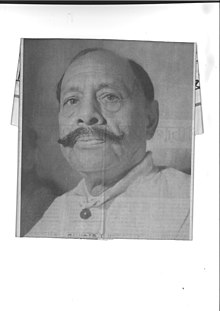Faiyaz Khan
Faiyaz Khan | |
|---|---|
 | |
| Born | 8 February 1886 |
| Died | 5 November 1950 (aged 69–70) |
| Other names | Aftab-e-Mausiqi (the Sun of Music) |
| Occupation | Vocalist |
| Years active | 1924 – 1950 |
| Spouse(s) | His wife died soon after their marriage. He never remarried and died childless. |
Ustad Faiyaz Khan (8 February 1886 – 5 November 1950) was an Indian classical vocalist, an exponent of the Agra gharana of Hindustani classical music.[1][2]
According to SwarGanga Music Foundation website, "By the time he died at Baroda, he had earned the reputation of being one of the greatest and most influential vocalists of the century."[3]
Early life[edit]
Born at Sikandara in the North-Western Provinces in 1886, he was the son of Safdar Hussain, who died four months before his birth. He was brought up by his maternal grandfather, Ghulam Abbas (1825-1934), who taught him music up to the age of 25.[2][1][4] He was also a student of Ustad Mehboob Khan "Daraspiya", his father-in-law, Natyan Khan and his uncle Fida Hussain Khan. According to an article on a music website titled, 'Great Masters of Hindustani Music', "Faiyaz Khan's musical lineage goes back to Tansen (1493 – 1589) himself. His family is traced back to Alakhdas, Malukdas and then to Haji Sujan Khan (son of Alakhdas who became a Muslim)."[2]
Singing career[edit]
He was remembered as Mehfil Ka Badshah by those who lived during his time and went to his live concerts.[1] Considered a neo-classicist by some scholars of Indian classical music, Faiyaz Khan served for a long time as the court musician of Sayajirao Gaekwad III, the Maharaja of Baroda, where he was awarded the "Gyan Ratna" (Gem of Knowledge). The Maharaja of Mysore awarded him the title "Aftab-e-Mausiqi" (the Sun of Music) in 1908.[4][2] Faiyaz Khan's specialities were dhrupad and khyal, but he was also capable of singing thumri and ghazal. According to the musicologist Ashok Ranade, "There was no chink in his armour".[3][5]
Faiyaz Khan also composed several bandishes using the pen-name 'Prem Piya'.[3][1] His most popular thumri was Baaju band khul khul jaye. [2]
"He was a frequent performer in the musical conferences and circles of Lucknow, Allahabad, Calcutta, Gwalior, Bombay and Mysore and in concerts organized by provincial princes."[3] These princes often vied with one another to have the Ustad perform in their respective courts. The rulers of Baroda held him in high esteem and he was offered the seat to the right of the Maharaja of Baroda during the official functions of the royal court in 1912.[1]
He also performed at Jorasanko Thakurbari, the residential abode of Rabindranath Tagore (1861-1941), who was an admirer of the Ustad. It is known that he had held a musical session at Jorasanko a few years before the passing away of Tagore. Other well-known admirers include tabla maestros such as Ahmed Jan Thirakwa, Amir Khan, Ali Akbar Khan, Vilayat Khan and Ravi Shankar. Faiyaz Khan was a dignified performer, who often wore a silk sherwani with rows of medals awarded to him in public. Then later, he would perform flanked by sarangi and tabla players during his live concerts.[1]
Affected by a bout of typhoid in 1945 followed by tuberculosis restricted Faiyaz Khan to lower his pitch to B and B Flat, though in his prime, he always sang in C Sharp and C. The available recordings of the Ustad are almost entirely from his later years."[3]
Death and legacy[edit]
Faiyaz Khan died of tuberculosis on 5 November 1950 at Baroda, Gujarat in India.[1] Faiyaz Khan's tomb, situated in Vadodara, Gujarat was attacked during the 2002 Gujarat riots. Extensive damage was inflicted on the structure.[6]
Some of Faiyaz Khan's best-known students were Dipali Nag, K. L. Saigal[1] Dilip Chand Bedi, Sohan Singh, Asad Ali Khan (later migrated to Pakistan), Dhruvatara Joshi, Shrikrishna Ratanjankar and Jnanendra Prasad Goswamy, apart from in-house disciples such as Khadim Hussain Khan, Vilayat Hussain Khan, Latafat Hussain Khan, Ata Hussain Khan and Sharafat Hussain Khan. Faiyaz Khan himself was an admirer of Abdul Karim Khan of Kirana gharana. S. N. Ratanjankar was perhaps the last of his pupils who excelled both as a teacher and as a performer. He blended the styles of his many gurus giving the Agra gayaki a new direction. He set many new trends in classical music.[1]
Discography[edit]
| Release No. | Raga |
|---|---|
| N 36050 (HMV) | Ramkali (Alap & Khayal) |
| H 1331 (Hindusthan Records) | Purvi & Chhaya |
| HH 1 (Hindusthan Records) | Puriya & Jaijaivanti |
| H 793 (Hindusthan Records) | Jaunpuri & Kafi |
- 78 rpm side A Lalat Aalaap, side B 'drut' – tadapata hoon jaise jale bin meene (Hindusthan Records)
- Thumri Bhairavi Baazuband khul khul jaaey, his most popular thumri
References[edit]
- ^ a b c d e f g h i "Tribute to a Maestro - Faiyaz Khan". ITC Sangeet Research Academy website. Archived from the original on 10 June 2018. Retrieved 18 March 2024.
- ^ a b c d e "Profile of Faiyaz Khan". davidphilipson.com website. Archived from the original on 30 September 2023. Retrieved 18 March 2024.
- ^ a b c d e "Profile of Faiyaz Khan "Prem Piya"". SwarGanga Music Foundation website. Archived from the original on 11 November 2023. Retrieved 18 March 2024.
- ^ a b "Music lovers pay tribute to legendary Ustad Faiyaz Khan". Times of India newspaper. Archived from the original on 16 March 2023. Retrieved 18 March 2024.
- ^ "Agra gharana and profile of Faiyaz Khan". ITC Sangeet Research Academy website. Archived from the original on 7 April 2013. Retrieved 18 March 2024.
- ^ Rohiniprasad, K. (10 August 2005). "Profile of Ustad Faiyaz Khan, the great classical vocalist". rohiniprasadk. Retrieved 18 March 2024.
External links[edit]
- "Kudrat Rangibirangi" by Kumarprasad Mukhopdhyay, 1st edition.
